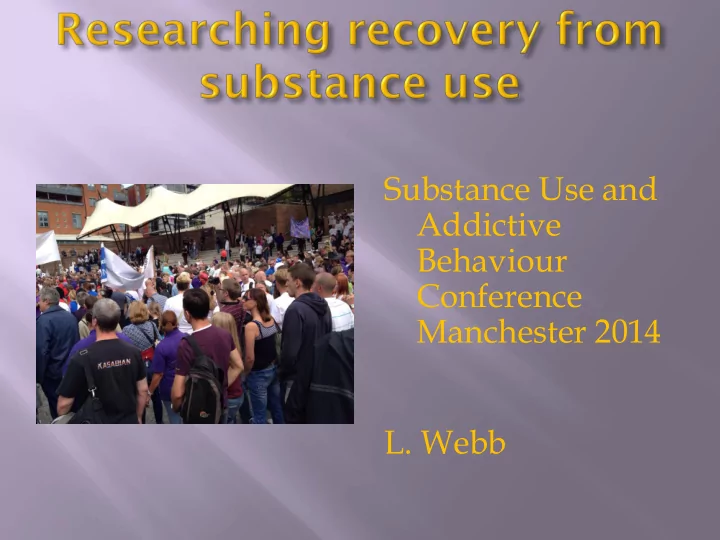

Substance Use and Addictive Behaviour Conference Manchester 2014 L. Webb
There are many pathways to recovery 1. It is self directed & holistic 2. Involves personal recognition of need for 3. change Has cultural dimensions 4. Exists on a continuum of health and 5. wellbeing Emerges from hope & supported by peers 6. Addresses de-stigmatization 7. US Centre for Involves rejoining and rebuilding Substance 8. Abuse Recovery is reality. Treatment 9. 2009
Human rights – respect, lack of stigma Collaboration – client centred goals Peer support – role models and validation Access to services – reduce barriers
Researchers need to work with the principles of recovery Be aware of power imbalance Be aware of skill sets of all stakeholders
How does policy structure resources for recovery? Operationalising recovery requires indicators, measures etc How can ‘recovery’ be measured? When do service providers become controllers?
Collaborative based participatory research Members of the community are co-researchers throughout the whole research process A combination of co-production and community action Not just participatory action research
Community members benefit from the process and the outcomes Builds trust between partners – working with less included groups and individuals in society
Co-production Working together Participatory action research Involving participants Community and social action Working with the community for community benefits
Durose et al, (2011) Co-production - an answer to the criticism: research excludes the communities it studies. Addresses the ‘relevance gap’ of applied research – highlights relevant questions neglected by ‘experts’ Benefits from experiential expertise and contribution from communities.
Communication is not seen as a one-way transfer (Pohl, 2010) Must not privilege theoretical work over practice oriented work (Durose, 2011). Not to create a dichotomy between ‘the mainsteam and the marginalised’ (Durose 2011)
Time & Rhythm importance of ‘lead in’ and ‘follow on’ periods of engagement Staying the distance ‘Hit and run’ & ‘smash & grab’ research causes damage to communities. Mutual benefit identify mutual benefits in advance. What will everyone get out of it? Durie et al (2011)
Current projects: Voices from the BRINK RECOVERY WALK MANCHESTER
Co-production Community/social action Sharing of resources Has non-academic benefits Shared decision- making Partnership is maintained Acknowledge difference and inequality Ethics is not a tickbox
Aims: to explore the use of digital media to engage people in recovery in self discovery Explore stories and experiences of recovery Outreach recovery among key stakeholders and the public
Procedure Work with community group to survey, outreach and capture recovery stories in the community and connected agents. Archive and curate self stories, experiences and reflections on change, impact and key self determined experiences of recovery
• Outreaching with the Activism VoiceBox Presenting at conferences NHS Collecting stories and Expo, INTAR, Big views – what is recovery, how does it feel? Sista, SUAB launch! Inreaching with the Recovery Walk – Voicebox outreaching and inreaching, Reflections on self networking, experience – change. contributing Speaking up for recovery
Made me proud of my recovery People believe in you Turning taboo into pride Active and productive member of this community
What stories epitomise recovery? What represents the experience of recovery? Where is recovery going? What questions should we be asking?
Cannot do co- Cannot do production without community action community action without co- production The community agenda becomes the Without co- researcher’s agenda production, community action The research becomes part of the community becomes ‘us’ and activity ‘them’ again – The results must feed researchers act as fly- back into the on-the-wall observers community agenda -uninvolved
Need a Need to agree what to gatekeeper/liaison research and what to agent do with it Need time spent to Funding needs to be build relationships joint: the fund holder is the power holder Need partners who are committed
Durose C. et al. (2011) Towards Co-production in research with communities. AHRC Connected Communities Project. Jacobsen, N. & Greenley, D. (2001). What is recovery? A conceptual model and explication. Psychiatric Services , 52, 482-485. Pohl, C. et al (2010) Researchers’ roles in knowledge co-production. Science and Public Policy 37(4) 267-281.
Recommend
More recommend